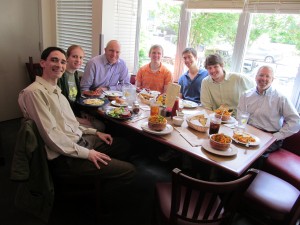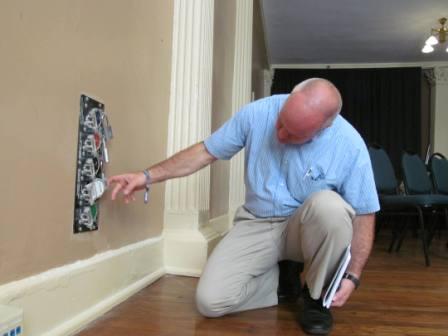Introduction

Thank-you to Dwight Schwartz, Ph.D., for sharing a glimpse of his academic/vocational journey through Candidate for What? A few questions for the reader as we wrap up the series with Part 5 (Click here for Part 1 on Pre-collegiate chemistry, here for Part 2 – 3 on Collegiate Chemistry, and here for Part 4 on his Postdoctoral Puzzle):
- How do you understand the purpose/value of academic studies?
- What do Emerging Scholars have to offer not only to the academic community, but also to other occupations, the people of God, and the wider society/culture — eventually spanning the globe through travels/connections/education?
- In addition to praying for InterVarsity Christian Fellowship‘s campus ministry, have you considered serving on, volunteering with, and/or advising InterVarsity Christian Fellowship staff (possibly with a Graduate & Faculty Ministries focus)? Note: Personally I have benefited from Dwight’s insights with regard to the process and pressures of graduate school when relating to graduate students not only on campus, but also at special events such as graduate student retreats and meetings (e.g., American Scientific Association). Thank-you Dwight!
- How do you share your journey in higher ed with others? In what manner does your faith relate to your vocation? Note: If you have interest in sharing your story with Emerging Scholars, please click here to read a description of writing for the blog and drop ESN an email. In addition, I am always open to advice regarding InterVarsity’s labors in relationship to Emerging Scholars and higher education (both in a general and a specific case study manner). So please don’t stop sharing the helpful insights 🙂 ~ Thomas B. Grosh IV, Associate Director of ESN, editor of ESN’s blog and Facebook Wall.
Part 5
Around the same time as my formal postdoctoral studies were coming to an end, a friend of mine on InterVarsity’s campus ministry staff asked a question that had crossed my mind a time or two before: “have I ever considered joining InterVarsity to work with graduate students at a university somewhere?” With this verbal “ask,” I took up the consideration of this question with more seriousness and regularity, and, simultaneously, began to wonder what kind of life I might have if my idea of becoming a professor were not to be. Still, I didn’t give up on the idea of a career as a professor somewhere.
I decided that I needed to make a serious effort to obtain a faculty position, and so I eventually prepared my curriculum vitae and searched for faculty positions. In response to all the letters I sent out – I did not send out an inordinate number – I received one inquiry. This inquiry translated into a visit to a university and that visit translated into an offer of a position at that university. The nature of the offer settled for me the question of whether a fulfilling position as a faculty member was likely to come my way: it was not without a lot more plodding along in temporary positions.
I am aware now, and was aware then, that my trajectory through graduate school and postdoctoral studies did not exactly set me up well for a faculty position (not, of course, through any fault of my many academic mentors along the way). But I am also aware that one of the survival techniques that academics must learn to incorporate into their thinking is the suspension of disbelief in the face of the seemingly long odds against success (e.g., one has to deal with and suspend judgment on questions like these: Will I get into graduate school? Will anyone allow me to do research in his lab? Will anyone accept my paper for publication? What will my adviser think when I tell him my latest idea, or report unexpected problems in my research? You only really know the answers to these questions after you take some existential leaps and “see what happens.”). So I sought a faculty position with nothing like confidence that anything positive would result from the search, and I was as surprised as anyone to be offered a job. I just undertook the search for a faculty position because it is what people do when it is time to search for a faculty job.
Having given up on finding a faculty position that would work for me, I therefore turned my attention to the idea of joining the campus ministry staff of InterVarsity Christian Fellowship’s Graduate and Faculty Ministries. This idea had been waiting in the wings as a serious idea since the time my friend had brought it up. I applied for a position, filled out a lengthy – lengthy! – application, was interviewed, and eventually accepted for a position working with the already existing Graduate Christian Fellowship at Johns Hopkins University in Baltimore, MD.

Parenthetical Epilogue
I wonder whether some pieces of my story – or perhaps my analysis of it – will grate on some who read this. There is much to criticize about how I pursued a career in academia, and I can imagine that some are wondering how I could have thought that I was a legitimate candidate for the things I was pursuing along the way. In fact, in my transit through higher education, my time as an undergraduate was the only time when I did not feel completely like an academic “black sheep” who would eventually be “left outside” of the “pen” at “night” for “consumption” by “the wolves” (I leave it to the reader to interpret the parable). To explain that this is how I perceive(d) my academic career is not easy. What I am sharing about my seemingly unsteady pursuit toward, and then, all at once, away from a faculty job . . . I do not see this as the ordinary – the approved – sort of sharing that people in academia like to do. But it is in fact the way my academic trek unfolded.
I hasten to emphasize, lest there be any doubt, that I have a deep and abiding respect for many fine individuals in the academic community whom I have come to know in and outside of my field during my academic studies, and for the institutions at which I was privileged to study. There are many people who do good work in these places, and it was a privilege to associate with them. And I am so thankful that many of these individuals persisted through the rigors (and perhaps, the “terrors”) of academic preparation that are part of becoming college and university faculty members. So the point of all of this has not been to cast doubt on the academic enterprise nor the average person who works therein. And it has not been my idea to undermine the courage and legitimate sense of purpose with which many are pursuing or have pursued faculty positions.
A final note from the editor . . .

As Dwight Schwartz now serves as the Mid-Atlantic Area Director for InterVarsity Christian Fellowship’s Graduate and Faculty Ministries, he is looking for a Graduate and Faculty Ministries staff to serve Johns Hopkins University (JHU). If you and/or others you know have interest in becoming a staff at JHU in specific, in addition to exploring the resources available at InterVarsity’s campus opportunities page, I encourage you to read/share the Campus Opportunties PDF on JHU and contact Dwight via email.
AND once again, thank-you to Dwight Schwartz, Ph.D., the Mid-Atlantic Area Director for InterVarsity Christian Fellowship’s Graduate and Faculty Ministries, for taking a few minutes to share a glimpse of his academic journey through Candidate For What? I look forward to the insights he will relate offer in future contributions to the ESN blog. Stay tuned. To God be glory! ~ Tom
Dwight Schwartz is the Mid-Atlantic Area Director for InterVarsity Christian Fellowship’s Graduate and Faculty Ministries. He joined the staff of InterVarsity Christian Fellowship in 2003 after completing doctoral studies in Chemical Physics (UIUC, 1997), and postdoctoral research, teaching, and IT support at Montana State University—Bozeman. He is married to Maria (Kowalsky) Schwartz. Dwight enjoys engaging graduate students and faculty members across the spectrum of academic disciplines in matters of importance to scholarship and the Christian faith. He maintains an active interest in science, electronics, computers, and computer programming. Dwight is a member of the American Chemical Society, the American Physical Society, and the American Scientific Affiliation.

Leave a Reply